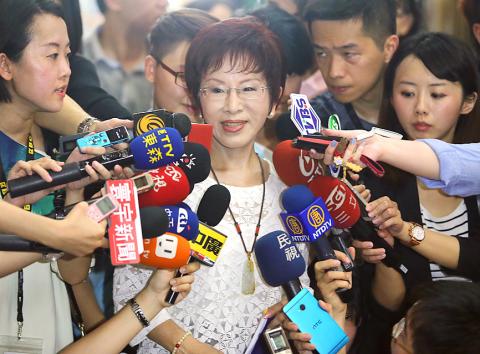Chinese Nationalist Party (KMT) headquarters is getting impatient with unilateral discourse on China issues from presumptive party presidential candidate Hung Hsiu-chu (洪秀柱) and plans to speak with her soon, party sources said.
During a TV interview on Thursday, Hung said her “one China, same interpretation” formula aims to have Beijing recognize the existence of the “government” of the Republic of China (ROC), rather than the “existence” of the ROC, which would constitute a “two-state theory.”
Hung’s formula is apparently at odds with the so-called “1992 consensus” — a supposed tacit understanding between the KMT and Beijing that both sides of the Taiwan Strait acknowledge there is “one China,” with each side having its own interpretation of what “China” means.

Photo: CNA
KMT Secretary-General Lee Shu-chuan (李四川) has said that the “1992 consensus” is entrenched in draft amendments to KMT policy guidelines that seek to realize a “five-point vision” put forward by former vice president and then-KMT chairman Lien Chan (連戰) and then-Chinese president Hu Jintao (胡錦濤) in 2005.
The five-point vision proposal includes the promotion of cross-strait economic exchanges, the termination of cross-strait animosity and the establishment of regular party-to-party communications platforms.
The draft amendments — pending approval at the party’s national congress scheduled for July 19 — would be the central platform on which all KMT candidates must base their election campaigns, Lee said.
Hung’s campaign office spokesperson Jack Yu (游梓翔) said that her policies — despite being worded differently — “are completely aligned with the ‘1992 consensus’ and the five-point vision as stipulated in the draft amendments.”
Hung has called on Beijing to recognize the existence of the ROC, a position espoused by President Ma Ying-jeou (馬英九) without being highlighted as Hung has done, Yu said.
The KMT has reportedly been urging Hung to tone down her speeches and put less emphasis on cross-strait relations to avoid controversies, while focusing her campaign on garnering support at the grassroots level.
Hung, rather than exposing her vulnerability with the “one China, same interpretation” formula, should base her position on the “1992 consensus” and exploit the Democratic Progressive Party’s (DPP) perceived weakness in its China policy — a strategy formulated by KMT Mainland Affairs Department director Kao Koong-lian (高孔廉) that Hung promised to maintain, but apparently has failed to do, party sources said.
The KMT caucus and a KMT think tank have set up a task force to assist Hung’s campaign, but the party is at a loss to help her with her repeated mistakes, the sources added.
A number of KMT legislators representing districts in central and southern Taiwan have raised concerns over Hung’s controversial remarks, party sources said, adding that Hung had called for a KMT caucus meeting to clarify her stance, but the initiative might not succeed, as the Legislative Yuan is in recess.
“The election is not an academic seminar, nor where a party’s direction is put to debate,” a pan-blue camp critic said, adding that Hung has sacrificed a winning hand against the DPP by throwing the KMT’s China policy into disorder and creating confusion among neutral voters.
The former DPP administration radicalized its cross-strait narrative in its final term in office, which — coupled with its failed administrative efforts — contributed to its defeat in the 2008 presidential and legislative elections, the critic said, asking whether the KMT could afford to repeat that mistake.

‘DENIAL DEFENSE’: The US would increase its military presence with uncrewed ships, and submarines, while boosting defense in the Indo-Pacific, a Pete Hegseth memo said The US is reorienting its military strategy to focus primarily on deterring a potential Chinese invasion of Taiwan, a memo signed by US Secretary of Defense Pete Hegseth showed. The memo also called on Taiwan to increase its defense spending. The document, known as the “Interim National Defense Strategic Guidance,” was distributed this month and detailed the national defense plans of US President Donald Trump’s administration, an article in the Washington Post said on Saturday. It outlines how the US can prepare for a potential war with China and defend itself from threats in the “near abroad,” including Greenland and the Panama

A wild live dugong was found in Taiwan for the first time in 88 years, after it was accidentally caught by a fisher’s net on Tuesday in Yilan County’s Fenniaolin (粉鳥林). This is the first sighting of the species in Taiwan since 1937, having already been considered “extinct” in the country and considered as “vulnerable” by the International Union for Conservation of Nature. A fisher surnamed Chen (陳) went to Fenniaolin to collect the fish in his netting, but instead caught a 3m long, 500kg dugong. The fisher released the animal back into the wild, not realizing it was an endangered species at

The High Prosecutors’ Office yesterday withdrew an appeal against the acquittal of a former bank manager 22 years after his death, marking Taiwan’s first instance of prosecutors rendering posthumous justice to a wrongfully convicted defendant. Chu Ching-en (諸慶恩) — formerly a manager at the Taipei branch of BNP Paribas — was in 1999 accused by Weng Mao-chung (翁茂鍾), then-president of Chia Her Industrial Co, of forging a request for a fixed deposit of US$10 million by I-Hwa Industrial Co, a subsidiary of Chia Her, which was used as collateral. Chu was ruled not guilty in the first trial, but was found guilty

The Chinese Nationalist Party (KMT) is maintaining close ties with Beijing, the Democratic Progressive Party (DPP) said yesterday, hours after a new round of Chinese military drills in the Taiwan Strait began. Political parties in a democracy have a responsibility to be loyal to the nation and defend its sovereignty, DPP spokesman Justin Wu (吳崢) told a news conference in Taipei. His comments came hours after Beijing announced via Chinese state media that the Chinese People’s Liberation Army’s Eastern Theater Command was holding large-scale drills simulating a multi-pronged attack on Taiwan. Contrary to the KMT’s claims that it is staunchly anti-communist, KMT Deputy